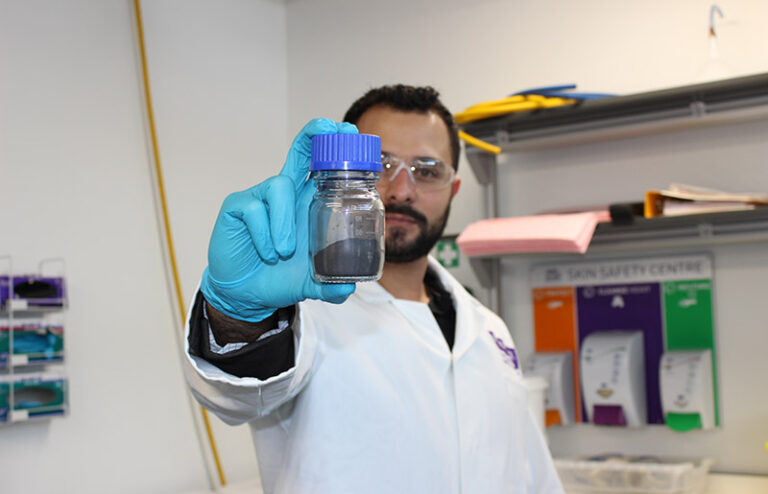Beyond steel: how Gerdau is evolving through advanced materials
Collaborations Graphene Engineering Innovation Centre National Graphene Institute Research 17 July 2020
In June 2019, when Brazilian steel company Gerdau signed a Tier 1 membership with the Graphene Engineering Innovation Centre (GEIC), Gerdau CEO Gustavo Werneck heralded the deal as important in developing the company’s ‘bureau of innovation in advanced materials’. So has it lived up to expectations? And what has been the impact of Covid-19 on progress?
We sat down with Danilo da Silva Mariano, leader of Gerdau’s Graphene and Advanced Materials R&D Centre, to find out more about the partnership and why Gerdau chose to work with Graphene@Manchester.
So Danilo, tell us a little bit about Gerdau.
Gerdau is the largest supplier of long steel in South America and supplies material for the construction, automotive, wind, power and oil and gas industries.
And what is your role within the organisation?
I play many roles from my base in the GEIC but to summarise, I act as a middle man. From speaking to our customers and partners to identify their needs, to transforming these needs into a scope of work to our team of researchers, carrying out testing in our lab and then translating those results into prototypes or solutions.
Can you tell us a little bit about the projects you’ve been working on in the GEIC?
We’re looking at using graphene for anti-corrosion coatings, composites for the automotive industry, membranes and energy storage materials and technologies.
We started to see a trend in the automotive industry, wanting to produce lighter cars – especially as a lot of companies are looking to make the switch from petrol to electric cars – and we knew we needed to reinvent ourselves in order to remain competitive.
Why did you choose to partner with Graphene@Manchester?
We looked all over the world for institutions to partner with and Manchester was mentioned by most of them as the ideal place to develop graphene applications. Nowhere else had the maturity of technology development and knowledge across such a wide breadth of subject areas.

Sometimes it can take a long time to get contracts agreed and then never see any results, so we were really pleased with how quickly the University responded.
Some of our projects will also transition from the GEIC into the National Graphene Institute. Being able to work with two different facilities within the same University and having this structure really helps us to move forward.
Coronavirus paused your work in the GEIC. What have been the most pressing issues for Gerdau that the crisis has posed?
The first has been human resources. We wanted to expand our department from five people to nine, but we can’t hire anyone. So we’re going to stick to five throughout this year at least.
Second is the budget for research. Overall we have to cut about 40%, but because we see so much value in the GEIC and in Manchester, our slice of the pie is comparatively bigger, so our cut is about 20% – way less than other departments. A lot of other things are being sacrificed elsewhere in the company for us to keep going strong here.
Outside the company, we see an even bigger impact. Because so many of our partners and projects have put things on hold, it takes so long for decisions to be made.
But even with everything that’s been going on over the past three months and not being able to be in labs, we’ve been doing a lot of homework, studying and putting more projects in motion. So things might be slower, but they didn’t stop, which is really positive. We’re going to double the number of ongoing projects in the GEIC for the second semester and we just filed our first patent.
Tell us about that…
The patent is so important for us. It was one of our first GEIC projects and was really promising. We checked all over the world to see if our invention was innovative and we’ll be releasing a statement soon about that rapid journey with the GEIC: arriving in September [2019], doing tests through to March and having a patent filed in the middle of the coronavirus pandemic. That’s pretty cool.
Gerdau is 120 years old as a company and this is only its 17th patent and the first that isn’t for steel. So this is a stepping stone for us – we’re hoping to double the number of our patents in the next three years. Now we are consolidating all of this dreaming and innovation into products, so that’s pretty important for our history.
What’s it been like for you in Manchester in lockdown?
So much has changed. After getting here in September, I was still adjusting to the city and then boom! This happened. It’s taken a lot of adaptability. I didn’t really know anyone when I got here – just a couple of people at the GEIC – then I met some friends. And then you’re told you can’t see your friends anymore, so it’s a weird dynamic, like for so many people.
And how has it been, getting back into the labs now the phased return has begun?
Luckily, Gerdau was in the first wave of people to get back into the GEIC, which was one of the first buildings in the University to reopen. It’s a different experience, with all the Covid protocols in place for hygiene in the building, but it’s a necessary distraction, I guess. There’s a lot to think about and you have to move at a slightly slower pace.
But it feels so good to be back in – talking to the technicians, getting things done, it feels like coming out of a coma. I’m an optimist, so I at least think we’re going to learn a lot from this crisis.
Find out more about how Graphene@Manchester engages with business on our website, or contact us directly for more information.

